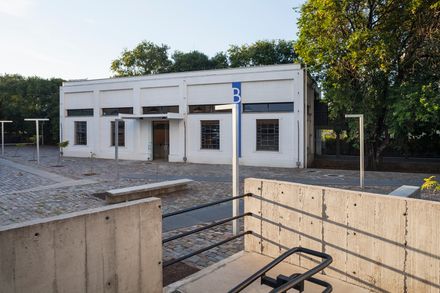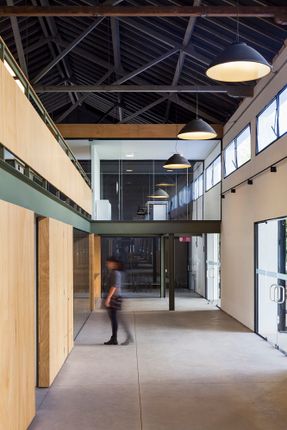CIC do Imigrante
LANDSCAPE
Soma Arquitetos
ESCOLA DA CIDADE
Ciro Pirondi, Anália Amorim, Felipe Noto, Marta Moreira
ESCOLA DA CIDADE TEAM
Denis Joelsons, Lara Ferreira, Adriana Matsufuji, Letícia Amado, Beatriz Hoyos, Murillo Lazzari, Pedro Nischimura.
STRUCTURE
Inner Engenharia
ELECTRIC AND HYDRAULIC INSTALLATIONS
Phe Engenharia De Projetos
LIGHTNING AND AMBIENTAL CONFORT
K2 ARQUITETURA
ARCHITECT IN CHARGE
Felipe Noto
MANUFACTURERS
Arquitetura da Luz /, Gomez & Moraes Estruturas Metálicas, Insign, Marcenaria Lacerda, Montele, Stone, Tok&Stock
SIGNALING
Escola da Cidade, Ana Carolina Hidalgo Martini, Manuela Raitelli, Marina Brant, Rebeca Domiciano de Paula, Vitor Hugo Pissaia, Hermann Tascht, Luis Felipe Abbud
DESIGN TEAM
Escola da Cidade, Felipe Noto, Maira Rios, Paulo Emilio Ferreira
ELECTRIC
Phe Engenharia De Projetos
HYDRAULIC
Phe Engenharia De Projetos
ELECTRICAL
Phe Engenharia De Projetos
LIGHTING AND AMBIENTAL COMFORT
K2 ARQUITETURA
CATEGORY
Community, Refurbishment
LOCATION
Barra Funda, Brazil
Text description provided by architect.
The new Citizenship’s Centre for Immigrants in Barra Funda, São Paulo, came up from of a partnership between São Paulo’s State Department of Justice and Defense of Citizenship and the architecture school Escola da Cidade with the financial support of Inditex and the State Labor Prosecutor’s Office.
The project was developed as a pedagogical effort of academic extension, involving undergraduate and graduate students and professors.
The proposal faces the challenge of converting railway buildings into meeting spaces, welcoming people and providing basic instruments of citizenship to the immigrants that arrive in São Paulo.
In addition to the good metaphor (the train, the station, the arrival), the two buildings were immediately detected as the best structure to adapt:
continuous and big enough space, with the possibility of expansion over time within the same logic of intervention.
The main idea was to provide a nice welcome place with a large reception square along the street, accessible by some steps or ramps.
This open space is not only an arrival, but also the connection to the two occupied buildings and is able to define the using spaces of the complex, separating cars and pedestrians zones.
The square extends to the existing garden by boundaries of the railroad, and becomes a public space suitable for the frequent celebrations, assemblies and meetings of organized entities of immigrants.
The railroad operation building was converted into supporting spaces such as a coffee shop, children’s space and internet access.
All the roof has been rebuilt, and the entire system for doors, ventilation and lighting has been reviewed.
The linear shed building concentrates the service sector - to be operated by the Federal Police, the main support agent for documents and regularization of foreign people.
The longitudinal dimension of the old railway warehouse is reaffirmed by the organization of the service stations, aligned along almost 70 meter. The original elements of the roofs were restored and, without any ceiling, called to participate in the space in the new venue.
A third element is proposed as a link between the two existing blocks and as a solution of separation of users: a steel mezzanine partially defines in its upper level the private office spaces and organize the public service and support spaces at the lower level.






















